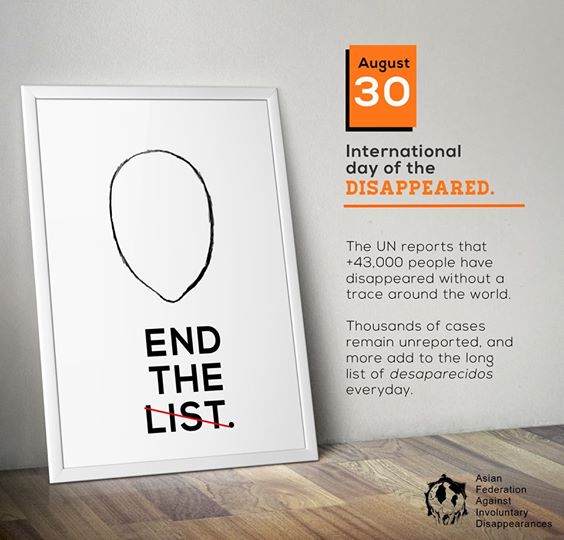
FOLLOW THE DESAPARECIDOS,
DEFEND DEMOCRACY AND GOOD GOVERNANCE
It was only three years ago that the United Nations declared August 30 as the International Day of the Victims of Enforced Disappearance. For years, however, the families of desaparecidos across continents marked the day as the International Day of the Disappeared to pay tribute to their missing kin.
Today, as the world observes the Day of the Disappeared, FIND and AFAD celebrate the sterling lives of the desaparecidos as defenders of freedom and democracy and as catalysts of developmental change. In this light, we invite President Aquino to train his warning against pseudo-reformists not only on his critics but on himself and his cohorts in government first. In paying tribute to past and present-day heroes on August 25, National Heroes’ Day, the President cautioned against “those who only pretend at reform.”
The genuine pro-people struggles of the desaparecidos for societal change should inspire self-declared reformists within and without government to tread the oft-invoked but yet to be walked straight path. And the people must be vigilant against the resurrection of a dictatorship that stifles political dissent with unrestrained enforced disappearances, torture, and extrajudicial killings.
The long road to EDSA 1 was paved by the blood and sweat of courageous political activists, at least 878 of whom have been forcibly disappeared. These include: student activist Rizalina Ilagan, college professor Charlie del Rosario, public accountant Romeo Crismo, labor and human rights lawyer Hermon Lagman, labor leader Victor Reyes, Benedictine deacon Carlos Tayag, Redemptorist priest Rudy Romano.
We strongly urge the inter-agency committee on torture, enforced disappearance and extrajudicial killing that the President created under Executive Order No. 35 to investigate all unresolved reported enforced disappearances under past and present administrations.
Enforced disappearances are continuing crimes as long as the fate and whereabouts of the victims are not yet established with certainty. These unclarified disappearances that began before the effectivity of R.A. 10353, the Anti-Enforced Disappearance Law, and whose victims have not yet surfaced alive can still be prosecuted under the said Act.
We call for the full and strict implementation of R.A. 10353 and the Philippines’ immediate signing and ratification of the nearly four-year-old International Convention Against Enforced Disappearance (Convention). Both State responses seek to serve justice and break impunity. Being complementary and mutually reinforcing, together they can end the list of desaparecidos and be an enduring tribute to all victims of enforced disappearance.
We also call on the Filipino public to stand in solidarity with our brothers and sisters in different Asian countries where enforced disappearance continue to wreak havoc among human rights defenders and their communities. Asian peoples are the most victimized by the practice of enforced disappearance over the past years. Unlike in other regions of the world where regional mechanisms are already instituted, there is none yet in Asia. The practice is still continuing with 14 Asian states out of 21 asked to respond to 93 new cases lodged at the UN Working Group on Enforced or Involuntary Disappearances (UNWGEID), as contained in its August 4, 2014 report to the UN Human Rights Council. Families of victims of enforced disappearance are putting their hope on the Convention as a legally-binding measure to address their quest for truth and justice. But in Asia, only Iraq, Kazakhstan, Japan and Cambodia have so far ratified it.
The list of desaparecidos in the Philippines and around the world has become too long and too painful to endure. It is high time that this global menace be eradicated. It is time to end the list! One meaningful step towards achieving this goal is to strengthen and uphold the International Convention For the Protection of All Persons from Enforced Disappearances by joining the 93 signatories and 43 States Parties to the Convention. The Convention is a product of decades of struggle of families of the disappeared around the world to have a normative human rights instrument that crystallizes the right not to disappear and seeks to guarantee non-repetition by establishing accountability on the government.
End the list, uphold the rule of law, sign and ratify the Convention!
